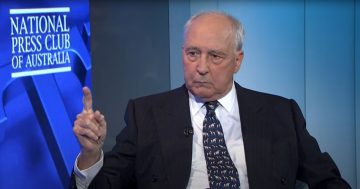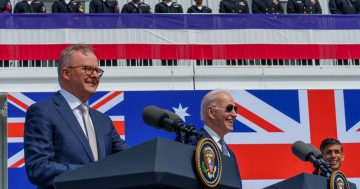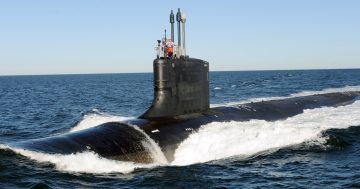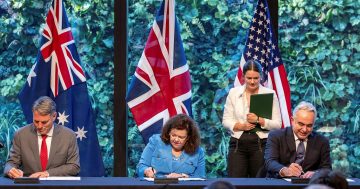
An artist’s impression of the SSN-AUKUS submarine design. Image: UK MoD.
Thank God for Paul Keating.
He may have a tendency to overreach more often these days, but he still has a turn of phrase with a rapier edge that makes people sit up and take notice.
Whether you consider him an apologist for the Chinese state or an elder statesman still willing to call out what he sees as idiocy, Keating, in his National Press Club appearance this week, threw a bomb into the bipartisan love-in on the $368 billion (so precise that number ) AUKUS nuclear submarine deal.
You don’t have to agree with all Keating said or accept whether he has got all his facts right to start wondering just what the full cost of this deal will be and what impact it will have on the Albanese Government’s and its successors’ agendas.
Already caught in a fiscal straitjacket, this Labor government will now have to factor in this deal and watch the social policy aspirations that should be the hallmark of a progressive government recede towards the horizon.
We have a housing and healthcare crisis that can only be fixed by serious Commonwealth money.
We need to urgently transition to a carbon-free economy.
The country has major infrastructure demands and bottlenecks, including big transport ideas like high-speed rail.
Our maligned public schools and universities need to be properly funded and restored to legitimacy after a decade of being run down.
In short, there is a lot for government to do.
But now, how much of this project will suck energy from government, other sectors of the economy and higher education?
Where will all the workers come from to not just build the subs but also support the local nuclear industry required to support them?
Will it be the basis for a hi-tech revolution or distort industry and education goals?
Then there are the question marks over a nuclear industry, not least of which is the disposal of radioactive waste.
Unfortunately, it will only encourage the proponents for a fully blown nuclear industry, including power stations.
There may be universal agreement among Australia’s security establishment about this decision, enmeshed as it is in the US strategic outlook and its goal of containing Chinese power, but the government should not take the Australian public for granted.
It needs to explain in detail why this deal is the right one and answer the multitude of questions it poses.
Many will give short shrift to China’s outrage at the decision and its talk of nuclear proliferation and an arms race after its ‘wolf warrior diplomacy’, trade wars and systematic development of its own formidable war machine, although it is still outgunned by the US.
Its bellicose stance since the rise of Xi has contributed to the situation, mistaking military might for greatness.
The context of Russia’s war on Ukraine also weighs heavily, and no one can doubt that these are anxious times.
But it does seem that, once again, security and defence agendas have pushed aside the hopes of those wanting a fairer society.
It is not the legacy that the many who voted for this government expected it to leave.
If nothing else, Keating has empowered the public to ask questions and put the government on notice that it will have to justify its decision.


















